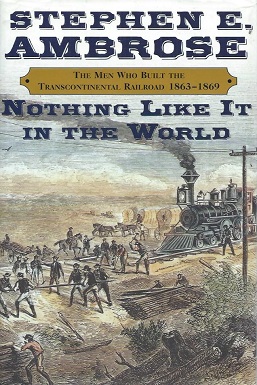Nothing Like It in the World facts for kids

First edition
|
|
| Author | Stephen E. Ambrose |
|---|---|
| Country | United States |
| Language | English |
| Subject | Transcontinental Railroad History |
| Genre | Non-fiction |
| Publisher | Simon & Schuster ( by Ambrose-Tubbs, Inc.) |
|
Publication date
|
August 2000 |
| Media type | Print (Hardcover & Paperback); Audio cassette |
| Pages | 432 pp |
| ISBN | 978-0-7432-0430-9 |
| OCLC | 44967527 |
Nothing Like It In the World is a non-fiction book by Stephen E. Ambrose. It tells the story of how the Pacific Railroad was planned and built in the 1860s. This amazing railroad connected the San Francisco Bay area all the way to Council Bluffs, Iowa. The book was first published in August 2000 by Simon & Schuster.
About the Book's Accuracy
When Nothing Like It in the World was released in 2000, it quickly became very popular. It even reached the top of New York Times Best Seller List for non-fiction books.
Why Accuracy Matters in History Books
Even though the book was popular, some experts and historians found problems with it. They pointed out that the book had many factual errors and mistakes. For history books, it is very important that all the information is correct. This helps us learn true facts about the past.
What Experts Said About the Book
Many professional historians and researchers who study railroad history reviewed the book. They said it was not well-researched or checked for facts. They found many errors, including wrong dates, incorrect locations, and quotes that were not accurate.
For example, a newspaper called The Sacramento Bee reported in 2001 that experts found more than sixty "significant errors" in the book. These errors were detailed in a study by historians who specialize in the Pacific Railroad.
Another newspaper, Washington Post, also mentioned that the author, Stephen Ambrose, promised to fix some errors in future versions of the book. University professors who reviewed the book also noted "annoying slips" and said the research seemed "once over lightly." This means the information was not checked as carefully as it should have been.

